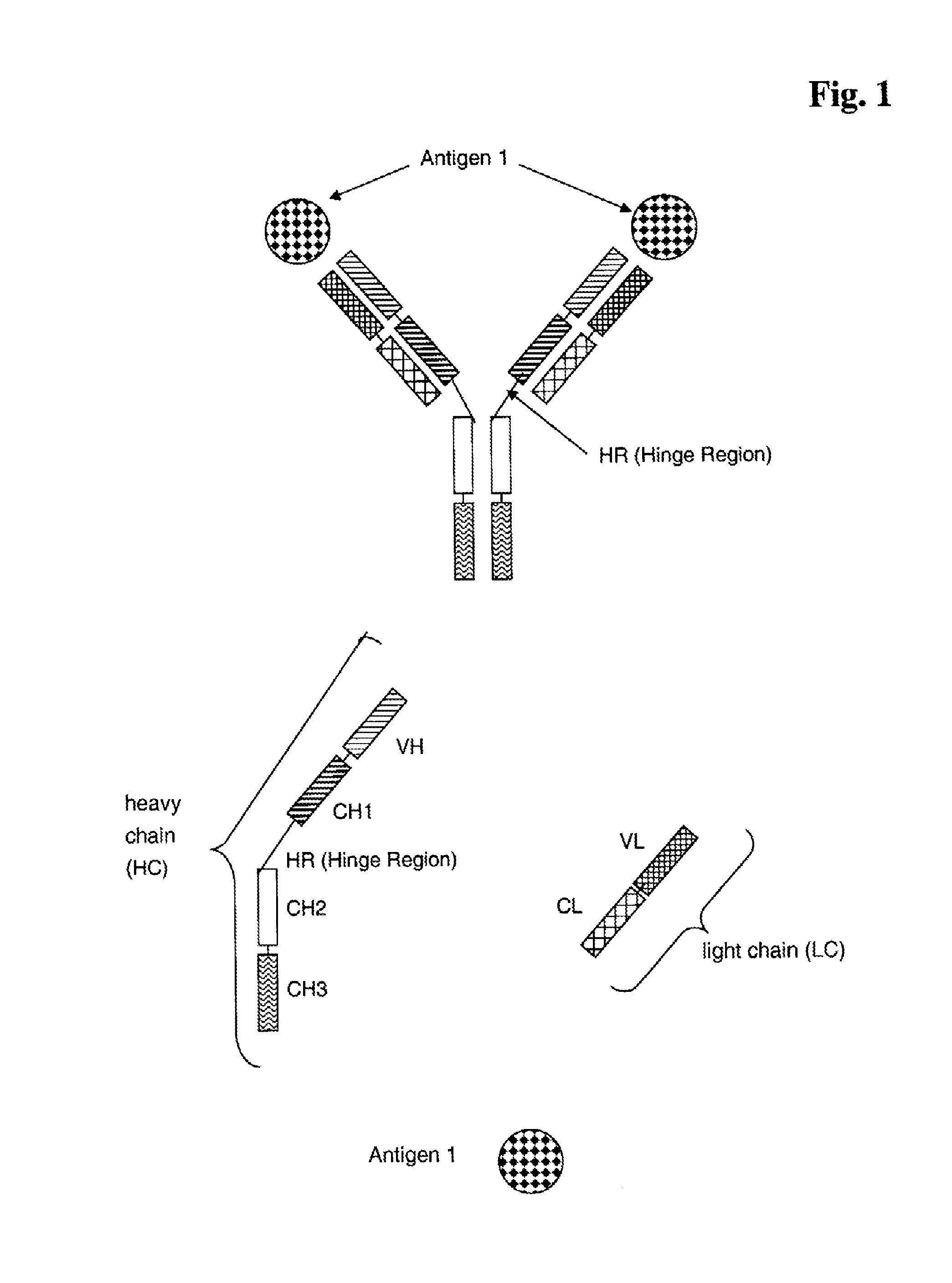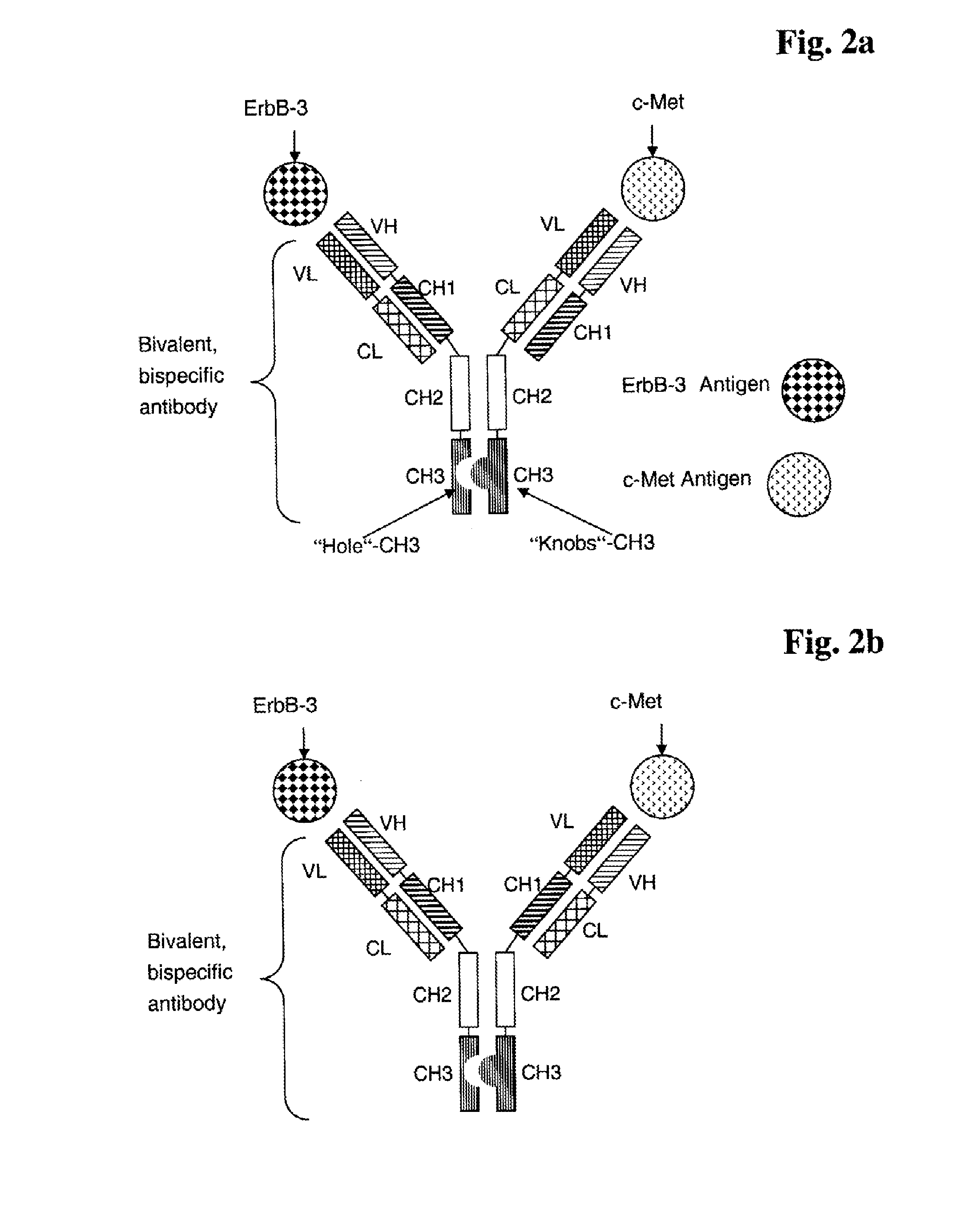Bispecific Anti ErbB3 / Anti cMet Antibodies
a technology of cmet and erbb3, which is applied in the field of cmet anti-erbb3/cmet antibodies, and achieves the effect of reducing the internalization of erbb3/antibody and high valu
- Summary
- Abstract
- Description
- Claims
- Application Information
AI Technical Summary
Benefits of technology
Problems solved by technology
Method used
Image
Examples
example 2
FIG. 9
Inhibition of HGF-Induced c-Met Receptor Phosphorylation by Bispecific her3 / c-Met Antibody Formats
[0301]To confirm functionality of the c-Met part in the bispecific antibodies a c-Met phosphorylation assay was performed. In this experiment A549 lung cancer cells or HT29 colorectal cancer cells were treated with the bispecific antibodies or control antibodies prior exposure to HGF. Cells were then lysed and phosphorylation of the c-Met receptor was examined. Both cell lines can be stimulated with HGF as can be observed by the occurrence of a phospho-c-Met specific band in the immunoblot. Addition of the scFv antibody or the 5D5 Fab fragment inhibits receptor phosphorylation demonstrating functionality of the c-Met scFv component.
example 3
FIG. 10
Inhibition of HRG-Induced Her3 Receptor Phosphorylation by Bispecific Her3 / c-Met Antibody Formats
[0302]To confirm functionality of the Her3 part in the bispecific antibodies a Her3 phosphorylation assay was performed. In this experiment MCF7 cells were treated with the bispecific antibodies or control antibodies prior exposure to HRG (Heregulin). Cells were then lysed and phosphorylation of the Her3 receptor was examined. Her3 / c-Met_scFV_SSKH and Her3 / c-Met_KHSS inhibit Her3 receptor phosphorylation to the same extent as the parental Her3 clone29 indicating that Her3 binding and functionality of the antibody are not compromised by the trivalent antibody format.
example 4
FIGS. 11,12,13
Inhibition of HGF-Induced HUVEC Proliferation by Bispecific Her3 / c-Met Antibody Formats
[0303]HUVEC proliferation assays can be performed to demonstrate the mitogenic effect of HGF. Addition of HGF to HUVEC leads to a twofold increase in proliferation. Addition of human IgG control antibody in the same concentration range as the bispecific antibodies has no impact on cellular proliferation while the 5D5 Fab fragment inhibits HGF-induced proliferation. If used at the same concentration, the Her3 / c-Met_scFv_SSKH antibody inhibits proliferation as good as the Fab fragment (FIG. 11). Heregulin (HRG) addition alone (data not shown) or in combination with HGF results in no further increase of proliferation (FIG. 12). This confirms that this readout allows the functional analysis of the c-Met component in the bispecific antibody format without interference of the Her3 component. Titration of Her3 / c-Met KHSS demonstrate a weak inhibitory effect of the antibody (FIG. 13). The ef...
PUM
| Property | Measurement | Unit |
|---|---|---|
| concentration | aaaaa | aaaaa |
| concentration | aaaaa | aaaaa |
| pH | aaaaa | aaaaa |
Abstract
Description
Claims
Application Information
 Login to View More
Login to View More - R&D
- Intellectual Property
- Life Sciences
- Materials
- Tech Scout
- Unparalleled Data Quality
- Higher Quality Content
- 60% Fewer Hallucinations
Browse by: Latest US Patents, China's latest patents, Technical Efficacy Thesaurus, Application Domain, Technology Topic, Popular Technical Reports.
© 2025 PatSnap. All rights reserved.Legal|Privacy policy|Modern Slavery Act Transparency Statement|Sitemap|About US| Contact US: help@patsnap.com



